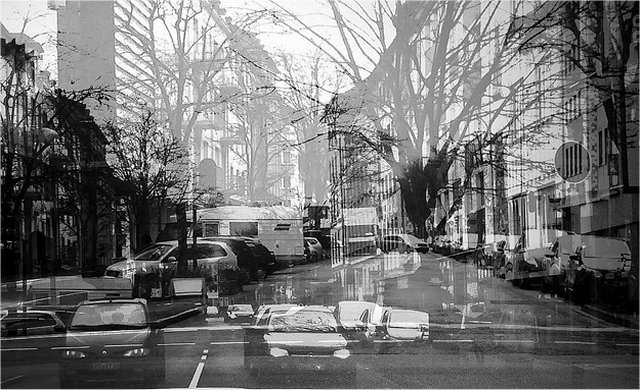Cola Hard Cash
At their last meeting, when the Fuel Cell’s solar expert reported they were out of silicon paint and his usual supplier had run dry, no one was surprised Marcus knew where to get it. The six members of the Fuel Cell pooled three hundred dollars between them. Stephanie had taken the cash and insisted on going with Marcus. After all, she’d pointed out, they needed a car, and Marcus didn’t drive.
As they made their way down Paramount Boulevard, swap meets, bottle stores and check cashing outlets slowly evolved into abandoned malls and empty carcasses of bloated mega-stores. The only crowd Stephanie saw spilled out from the Downey Church of Religious Science and Wedding Chapel. This had been a middle class town once, before the Bifurcation.
Six years before, the single housing market had split into two separate bubbles, each operating completely independently of the other. The wealthiest homebuyers shopped in the larger of those bubbles, and everyone else was left to scramble in the smaller one.
There were plenty of stories about people who’d lost their homes when they weren’t able to make mortgage payments, who found themselves moving back into the same homes or ones next door or just down the street as renters, only this time living in a half or a third of what they’d once owned. Pressures from the housing market leaked into other parts of the economy. Jobs started disappearing. Retailers dropped their prices because nobody had money to spend, but they couldn’t drop them low enough for people who had nothing at all. Consumer spending all but collapsed. The Federal Reserve tried to put a positive spin on it to keep Wall Street humming along. They called what was happening “a maturing of the market.” Everyone else called it the Bifurcation.
Marcus pointed ahead. “Take the next right up here.”
Stephanie turned onto a street that had once been lined with individual one-story, single family homes. The houses were now connected to each other with mismatched sheets of plastic siding in Mondrianesque quadrilaterals of white, blue, yellow and red to create a single building that stretched from one end of the block to the other. Although this was the first time she’d seen the area for herself, Stephanie knew about it. She’d read about how cement floors had been poured into the spaces between the houses, and these areas subdivided into rooms and rented out. Marcus pointed to take another right, and Stephanie saw that the long building continued around the corner and all the way down the block.
“Okay,” Marcus said, then paused to read the street sign they were passing. “We’re looking for an alleyway on the right, about four and a half blocks down.”
Stephanie counted out the blocks as they passed. She slowed the Honda and turned into a gravel alley.
“Now these are some scary motherfuckers we’re getting ready to meet,” Marcus said. “No matter what happens, keep your cool. It’s best if you stay quiet. Try not to talk so much the way you always do.”
“I do not talk too much,” Stephanie said.
Marcus curled a lip. “See. You always have to argue about everything. Just don’t, not here. Okay? This is serious.”
Stephanie said, “Okay.”
“Don’t make any sudden moves. Don’t look around too much. Do whatever I tell you, even if it seems weird. If I run, you better run too. Probably nothing will happen, but it never hurts to be prepared. You think you could find your way out of this neighborhood on your own? Maybe back up to Telegraph Road?”
“Sure. I think so,” Stephanie lied, feeling her heartbeat speed up. All week she’d imagined today would be like facing judge and jury in the courtroom. The burst of adrenaline that shot her up and out of her chair, squaring shoulders and tossing her long, dark hair back. Your Honor….
That was ordinary and she knew how to handle it. Marcus was making her nervous with his camouflage hat and dire warnings. This was turning out to be something else entirely, and Marcus was the one with home court advantage. She didn’t like that, but at least they were on the same team. She hoped.
“Good. I mean, you probably won’t need to. Still.” He shrugged rather than finish his sentence.
Whatever mad entrepreneur had filled in the spaces between the houses in this neighborhood hadn’t yet done the same to the garages, which lined both sides of the alley in various states of decay. These hadn’t been remodeled for human habitation, but it was obvious that people lived here.
“It’s that dark garage on the left,” Marcus said. “Pull up across from it and kill the engine.”
Stephanie brought the car to a stop opposite a gray aluminum garage that would have held two cars once upon a time. A rough window had been cut into one wall. Stephanie reached for the door handle.
“No, we’ve got to wait here. Engine off, but leave the key in the ignition.” From inside the car, Marcus gestured with hands and fingers toward the garage in some kind of signal. Stephanie turned in time to catch only a glimpse of the shadow of a face in the window turning away.
“What now?” she asked.
“We practice patience.”
A lifetime’s worth of slow, torturous minutes passed while they waited in the car. Although she wanted to gauge her surroundings, Stephanie made an effort not to look around too much. She kept trying to mentally retrace the route back to Telegraph Road but got lost every time.
Still, no one appeared. “You told me they were expecting us.”
“They are,” Marcus said. “Just chill.”
Suddenly, a skinny young white man with a thin, wistful moustache was knocking on her window. Where had he come from? He wore a dark green button down shirt and khakis. Stephanie turned to Marcus, who nodded and motioned to roll the window down. It was sticky in its rollers and twice Stephanie had to use both hands to get the crank moving again. Applying lessons she tried to teach her young clients about how to act when pulled over by the cops – why did she think they applied here? – she took care to move her hands slowly and keep them in view as much as possible.
Marcus leaned over and began talking through the driver’s side window in a language Stephanie couldn’t identify. She knew Spanish, and this wasn’t Spanish, although she heard a lot of words she could understand. Precio. Pintura. Mas barato. La proxima vez. What were they planning for the next time? There were too many other words for her to make out what they were saying. Then she heard something that sounded distinctly Chinese, and she realized what it was. Her clients sometimes spoke it. It was the trade language that had developed between southern California gangs and their Chinese arms suppliers. Mostly Spanish and Mandarin, but with a little Armenian, Russian, and Korean thrown in. Smark, they called it, its acronym. Had Marcus ever told her he could speak Smark? She couldn’t remember.
The exchange was cordial. Marcus and the man in the green button down seemed to know each other, although probably not in a friendly way. They both smiled, but Stephanie felt a chill breeze wafting between them.
Green button down suddenly began speaking very rapidly, his face reddening slightly. Marcus stumbled over a few words, then the guy turned and walked away.
“Where’s he going?” Stephanie asked.
Marcus said, “We’ve got a problem.”
“What have you done, Marcus?”
“I haven’t done shit! They want four hundred and fifty bucks for the paint.”
“We don’t have that much,” Stephanie said. This wasn’t exactly true. She had brought the three hundred from the collective, and added two hundred more of her own money. Marcus might think she was naïve, but she’d never expected this to go down without negotiations. When she handed over the additional money to cover the final price, he’d have to thank her bourgeois, middle-class life in the cash economy for it.
But she wasn’t going to just give it away.
Marcus stared out the windshield.
“So get him back here and start negotiating,” Stephanie said.
“What do you think we were doing?” Marcus said. “I got him down from five hundred.”
Click below for next page…



